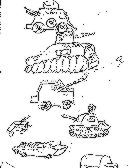1 9 4 0 - 1 9 4 5 : my "WAR" years
part 4
1 9 4 0 - 1 9 4 5 : my "WAR" yearspart 4 |

|
The last year of World War 2 was the worst in Amsterdam. We had
"Dolle Dinsdag" (Mad Tuesday) in September, 1944
when it looked as if we were going to be liberated in hours...
collaborators were arrested by the Dutch Underground, until it became clear that the liberation was to be delayed.
The "Battle of the Bulge"
was fought in the Ardennes, and in Amsterdam we had the most severe winter yet. All trees were cut down, blocks of djati-wood between trolley-rails were removed, anything to provide fuel more for heat than for cooking. There was not much to cook anymore, except sugarbeets and the wheat and rye we had collected. An ingenious invention, "het noodkacheltje" (the emergency stove) allowed one to
boil water using just a few pieces of paper and wood. This contraption consisted of two concentric cans put on top of a regular coal or woodstove, making most efficient use of draught. All sewers
were clogged and spilled over, fortunately - in this case - it was freezing...
| I spent days using a kitchen knife to cut out the stumps of the willowtrees of which the trunks had been removed, in front of our apartment. Potatoes were sold for 25 guilders each, and I saw one eager man eat one, then vomit it out into the gutter, where someone else slinked up and ate the product...And there were air-raids galore, most of them from planes going to bomb Germany, which was encouraging.
We did dangerous things, hiding 'onderduikers' and jews, listening to the illegal BBC radio, passing along illegal stencils, and smuggling any milk or vegetables we could secure from farmers outside Amsterdam: all my toys and most of my mother's jewelry and blankets were used to barter. | There were "razzias" to pick up any
man to be transported to Germany to work: anytime we heard about it, my father hid in a model warehouse he had built for me years ago. There were no longer any classes, except perhaps one morning a week. Things were miserable. I recall a little boy ringing the bell to beg for food. My mother gave him a slice of boiled ryebread she had made and topped with some jelly from sugarbeets. He took one bite, then handed it back to her. Mom: Why? He: Lust ik niet (I do not like it) She: Why not? He: Niet lekker..(does not taste good) She, turning purple: Ga jij dan maar bij de Koningin eten! (why don't you go and have dinner with the Queen!) |

| Finally, in early May, 1945, Canadian troops reached Amsterdam and everyone went berserk! We climbed aboard tanks for long rides, asked for "chocolat for my mammy" or "Cigarettes for my daddy", begged for insignia, signatures and K-rations. Around this time, we were also 'bombed' by friendly aircraft dropping white bread and other food donated by Denmark and Sweden, an unforgettable experience. Even more, because now when airplanes flew over we did not have to run for cover with our "vluchtkoffertjes" (little boxes with favorite possessions to be saved) |

|
I will not discuss the recriminations and hatred after the War when we found out about the holocaust, concentrationcamps, underground activities and collaboration, problems with the Japanese (as well as with the Allies..and the native population ) in the Netherlands East Indies, and more. Since I was not yet 13 when we were liberated, I always remember the War as a heroic period, with risks, adventure and ingenuity, and much mutual help. I also learned to save everything and to not even discard a single morsel of food.
| Links to Holland in the Second World War |
next page (1946-1950): |